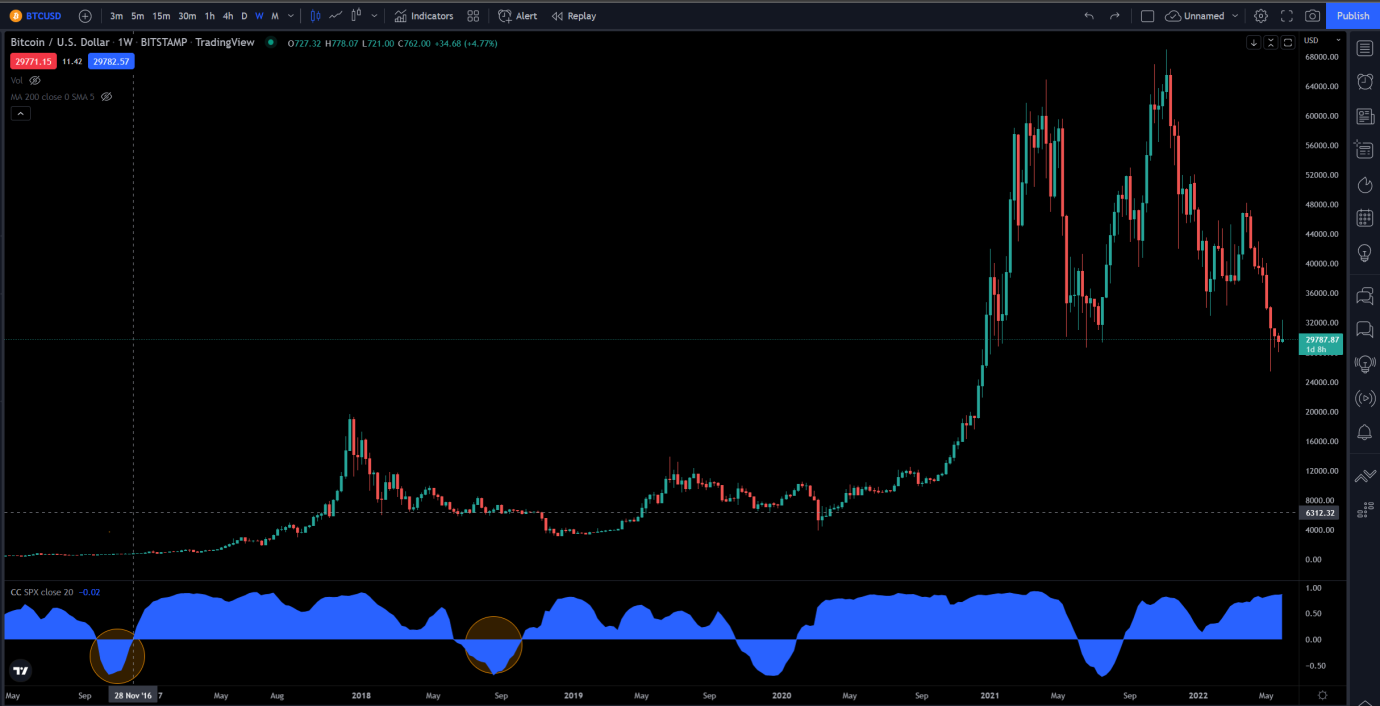
Crypto market & traditional financial markets
Is there any correlation between the crypto market and traditional financial markets?
A few years back, Bitcoin and other crypto-assets were considered an isolated asset class with few users. However, these assets have now become a vital element of the digital asset revolution in recent years with the developments.
The total market capitalization of crypto assets was $500 billion in 2017, which rose to $3 trillion in November 2021. Currently, the market cap is $1.2 trillion (in June 2022).
Before the Covid-19 pandemic, cryptocurrency assets like Bitcoin and Ether had minimal correlation with mainstream stock indices. They were supposed to aid in risk diversification and function as a buffer against volatility in other asset groups.
This, however, altered following the unusual central bank crisis reactions of early 2020. Both cryptocurrency and US stock prices have risen due to easy global financial conditions and increased investor risk appetite.
As an investment asset class, interest in Bitcoin and cryptocurrencies began in 2017 when Bitcoin's price crossed $1,000.
The occurrence was all over the media, and prices rose throughout the year, peaking above $17,000 before settling down in a range of $3,000 and $10,000.
The Covid-19 pandemic in 2020 caused major concern for investors to panic as companies and economies slowed and shut down.
During the pandemic, the S&P 500—the most commonly used stock index by investors to evaluate the market—lost more than 110 points as investors shifted their assets to alternative investments.
The United States economy entered a brief recession, then began a rebound in which stock values more than doubled their value by the conclusion of the recession.
By the time the index and the economy had recovered to pre-pandemic levels, investors were convinced that Bitcoin was a new asset class capable of generating returns even in the most challenging market situations.
Many firms had already begun to invest in cryptocurrencies, and the success of Bitcoin during the epidemic strengthened their positions and outlooks.
According to recent IMF research, the sentiment in equities and cryptocurrency appears to be more linked, heightening the "risk of contagion across financial markets.
" According to the IMF, Bitcoin's correlation to the S&P 500 was only 0.01 from 2017 to 2019, indicating that stock and cryptocurrency values moved independently. (Assets that move in complete lockstep have a value of one; those with no price connection have a zero value.) That changed in 2020-21 when central banks flooded markets with liquidity, and correlation increased to 0.36, showing that asset classes were becoming more closely related.
Bitcoin appears to be following developing economies, with a 0.34 correlation to the MSCI Emerging Markets Index in 2020 and 2021, increasing 17 times over previous years.
Crypto is now more tightly linked to equities than gold, investment-grade bonds, and major currencies, meaning diversification benefits have evaporated entirely.
Bitcoin has made its investment debut, attracting a sizable following of retail investors, institutions, and businesses.
Bitcoin, which had been exchanged on cryptocurrency exchanges like a stock for several years by early adopters, began to be treated like a stock by traders and investors, strengthening its place as an asset class.
More interest and funds came in when Bitcoin evolved into an asset class. Brokerages and institutions gained regulatory traction by offering investment alternatives such as Bitcoin-linked ETFs and 401(k)s that allowed investors to invest in Bitcoin. Investors appeared to get more comfortable with cryptocurrencies as institutions provided familiar tools.
In late 2021 and early 2022, cryptocurrency values climbed and dropped in tandem with equities prices. The weekly chart below compares the price of Bitcoin (BTC) to the S&P 500 (SPX).

We can see instances where there has been no correlation. In the last two years and 2022, Bitcoin prices appeared to be associated with equities.
There is, however, no solid evidence that they are. Based on pricing data, there appears to be a crypto investment and trading activity that mimics the stock market.
According to Tradingview, BTC and ETH tend to correlate, implying that cryptocurrencies generally have traded similarly.
